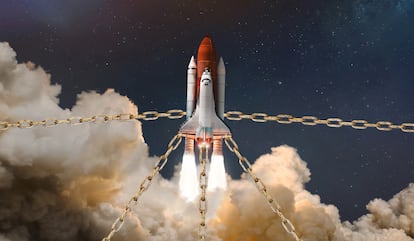Can masturbation abstinence make you more of a man? The far right thinks so, and support is growing
Theories claiming that lower sexual activity increases testosterone levels have been adopted by reactionary circles, who promote them as a way to recover a manhood they consider lost

The far right worships testosterone. Its adherents think that virility is best expressed as physical strength, as an overflowing libido and a dominant attitude towards women. Groups that support ex-president Donald Trump such as the Proud Boys, and controversial figures like David Duke, former head of the Ku Klux Klan, or the alt-right’s favorite psychologist, Jordan Peterson, all preach abstaining from masturbation: this is meant to restore a masculinity that’s been supposedly weakened by the rise of feminist consciousness and the quest for social justice.
It all started with NoFap, a growing online movement that invites men to give up masturbation for a period of 90 days with the promise of obtaining countless health benefits. Its origin dates back to 2011, when a user of the social network Reddit named Alexander Rhodes created a forum in which he claimed that when men do not masturbate for seven days, their testosterone levels experience an increase of 45%. The number of subreddit members increased until it reached almost a million users and as a result, the NoNutNovember challenge was born, in which participants abstain from masturbating or having an orgasm during the month of November.
The creators of NoFap insist on disassociating themselves from far-right rhetoric, but the truth is that a fundamentally misogynistic message has emerged from both the subreddit and YouTube comments that idealize the masculine traits associated with high levels of testosterone. For many users, women become a prize that they will achieve if they manage to go without masturbating for a specific period of time. Others go so far as to adopt abstinence to cure their homosexuality.
This anti-masturbation philosophy has managed to cross the boundaries of the online world and has begun to form part of the rhetoric of radical groups like the Proud Boys, who have been accused of participating in the assault on the US Capitol on January 6, 2021. In fact, anyone wishing to join the right-wing gang must go through an initiation ritual that includes being beaten by another member of the group, beating up an anti-fascist individuals, getting a tattoo and masturbating once a month at the most.

And they are not the only extremists waging a war against self-eroticism. Marcus Follin, a YouTube fitness guru with far-right sympathies, preaches against masturbation in his channel, with has more than 100,000 followers. David Duke, former head of the Ku Klux Klan and often described as America’s most well-known racist, argues that pornography is a Jewish conspiracy to make men masturbate instead of procreate. And the psychologist Jordan Peterson, author of the best-selling book 12 Rules for Life, has also explained on more than one occasion the problems that masturbation can cause in men’s lives.
The initial premise of the NoFap forum is based on a report published by Zhejiang University in 2003, which shows that after a week without masturbating, testosterone levels rose by 40 to 45% in individuals who were part of the study. Members of NoFap recount their own experiences and claim to have improved their sexual performance, self-confidence and even their memory. What is not discussed in the forum is that the same study states that after the first week, testosterone values dropped back to normal levels.
In fact, several other studies concluded that autoerotic abstinence has no effect on testosterone, and that testosterone levels are actually higher after masturbation or sex with another person. Testosterone, indeed, has immense benefits in our body: it stimulates muscle development, improves sexual performance and reduces the feeling of tiredness. What is not proven is that these benefits are obtained by abstaining from masturbation.
The sexologist Eva Moreno notes that refraining from self-pleasure can become unhealthy. “One of the benefits of masturbation is keeping the male genital machinery in shape. Like any other part of the body, when you don’t use it, it atrophies,” says this expert. Moreno also questions whether the image of the strong man with a vigorous member and great sexual performance is compatible with that of a person who does not masturbate. She says that self-pleasure helps us to get to know our body, to discover “our moment of no return” and to “strengthen the muscles of our pelvic floor.”
“If you don’t make an effort to discover yourself sexually, your performance in bed will be frustrating,” she adds.
From the times of the Greek physician Galen until just a few decades ago, it was believed that health depended largely on the correct balance of bodily fluids, including sexual ones. In the 18th century, the famous Swiss physician Samuel Auguste Tissot famously claimed that tuberculosis and other diseases were the consequence of solitary pleasure. Not to mention Dr. Edgard Spratling, who in 1895 stated that “completely severing the dorsal nerves of the penis is a rational treatment for constant masturbatory routines, but perhaps too radical.”
No matter how forcefully these ideas are debunked, there continue to be groups excited at the prospect of increasing their masculinity within a hegemonic concept that has become very popular among certain politicians. Brazilian President Jair Bolsonaro has on occasion confessed that he has to cry secretly because his wife believes he is “the most macho of machos.” In the US, Donald Trump brags about his sexual vigor one day and the size of his nuclear button the next.
This obstinate idea of the masculine has occupied thinkers like Paul B. Preciado. In Testo Yonqui the philosopher explains that “testosterone is not masculinity” and that the only thing that can be said with certainty is that the effects of this hormone have been, until now, “the exclusive property of cis-men (whose gender identity and sex assigned at birth coincide).
Tu suscripción se está usando en otro dispositivo
¿Quieres añadir otro usuario a tu suscripción?
Si continúas leyendo en este dispositivo, no se podrá leer en el otro.
FlechaTu suscripción se está usando en otro dispositivo y solo puedes acceder a EL PAÍS desde un dispositivo a la vez.
Si quieres compartir tu cuenta, cambia tu suscripción a la modalidad Premium, así podrás añadir otro usuario. Cada uno accederá con su propia cuenta de email, lo que os permitirá personalizar vuestra experiencia en EL PAÍS.
¿Tienes una suscripción de empresa? Accede aquí para contratar más cuentas.
En el caso de no saber quién está usando tu cuenta, te recomendamos cambiar tu contraseña aquí.
Si decides continuar compartiendo tu cuenta, este mensaje se mostrará en tu dispositivo y en el de la otra persona que está usando tu cuenta de forma indefinida, afectando a tu experiencia de lectura. Puedes consultar aquí los términos y condiciones de la suscripción digital.








































